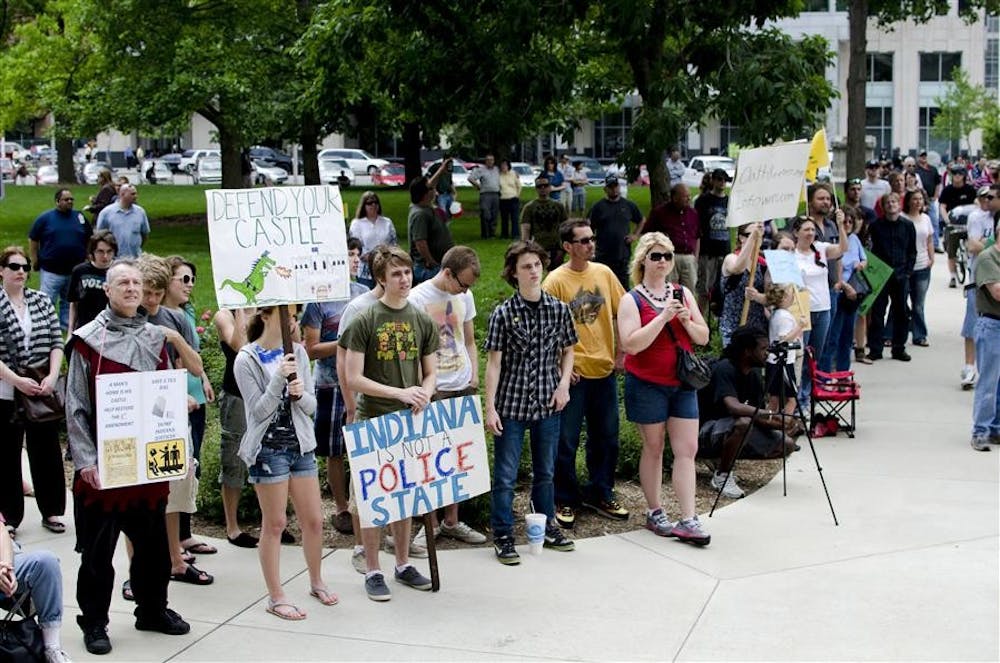Indiana residents have limited rights to resist police officers who enter their homes illegally, according to a new state law signed by Gov. Mitch Daniels.
Senate Enrolled Act 1, which was passed March 20, states that a person is justified in using reasonable force against a public servant if the person believes force is necessary to protect themselves or others from unlawful force, prevent or terminate unlawful entry into a home or prevent a public servant’s criminal interference with property lawfully in the person’s possession.
But residents engaged in illegal activity are unable to resist police, the statute states. An individual also may not resist an officer acting lawfully.
While some officials say the new law only clarifies already existing statutes, such as the Castle Doctrine, others fear the law will further threaten the lives of law
enforcement officers.
The law was drafted in response to a controversial Indiana Supreme Court decision in Barnes v. State of Indiana, which was decided last year.
In that case, an Ellettsville, Ind., man resisted a police officer who entered his home after receiving a call about a domestic disturbance. Although he was not charged with any other crimes, the man was charged with battery of a police officer for resisting.
The state’s highest court ruled that a citizen never has the right to resist an officer in pursuit of an investigation.
But many state lawmakers disagreed.
Sen. Mike Young, R-Indianapolis, who authored the bill, said the law does not give citizens any new rights. Instead, it clarifies the right Indiana residents have had for more than 200 years to resist anybody who enters a home unwarranted.
Cpt. Joe Qualters of the Bloomington Police Department said he worries the law will put the lives of law-abiding officers in danger.
“My concern is that citizens might think they know under what circumstances they could prevent entry by law enforcement when, in fact, it might not be one of the exceptions allowed,” Qualters said. “That will cause conflict and could escalate a situation simply because a person doesn’t fully understand the law or applies it incorrectly to their particular circumstances.”
Several Democratic lawmakers agree. But Democratic representatives Peggy Welch and Matt Pierce, both of Bloomington, understand the need for clarification.
Welch did vote in favor of the final conference committee report, but she said it was a difficult decision.
“A number of our law enforcement community feel it may be sending the wrong message to the public, that you can resist any time a police officer needs to enter your home,” Welch said. “People who are reasonable, people who are obeying the laws, you know, the police don’t have anything to be concerned about, and the citizens don’t have anything to be concerned about.”
Pierce said he agrees. Although he voted in favor of the original bill after it came out of the House of Representatives, he voted against the final conference committee report because the last attempt to tweak the bill made it more ambiguous, he said.
While the original version of the bill specifically referred to “law enforcement,” the final version of the bill uses “public servant.”
But regardless of his final vote, Pierce said he does not believe it will have an adverse effect on the safety of law enforcement officers.
“Most people don’t pay real close attention to what the General Assembly does, let alone carefully read the bills we pass,” Pierce said. “So I would be surprised if we have a sudden uptick of people resisting law enforcement under the theory that they’ve been given some new right by the state.”
Although Pierce said the bill will have a limited effect on the actions of Hoosiers, he said it will likely affect future court proceedings.
“Senate Bill 1 is really kind of a big jury instruction for lawyers to tell juries, ‘These are the factors you consider when you decide whether somebody has a good defense when they are being charged of assaulting a police officer,’” Pierce said.
Police resistance bill passes
Residents granted limited right to resist illegal entry by law enforcement

Get stories like this in your inbox
Subscribe





